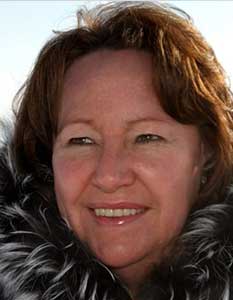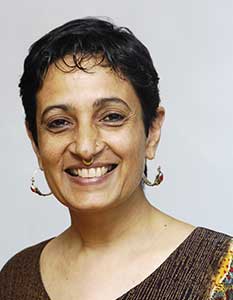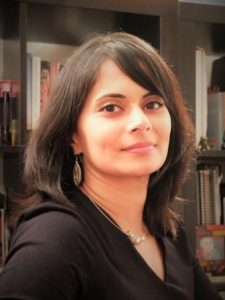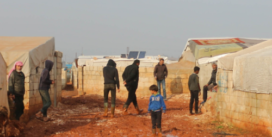- Fall Newsletter, 2025, Issue 15
- Using International Online Learning Modules to Engage Students in the Study of Critical Global Issues
- Upcoming Book Launch: Hearts of Freedom
- Announcing winners of the 2025 CARFMS Essay Contest
- The New York Declaration for Refugees and Migrants and its two Global Compacts: Addressing the Symptoms or the “Root Causes” of Forced Displacement?*
Keynote Speakers
Sheila Watt-Cloutier
 Presentation time/location:
Presentation time/location:
15 May at 7:30pm
David Lam Auditorium
University of Victoria
Environmental, Cultural and Human Rights Advocate
Nobel Peace Prize nominee Sheila Watt-Cloutier is in the business of transforming public opinion into public policy. Experienced in working with global decision makers for over a decade, Watt-Cloutier offers a new model for 21st century leadership. She speaks with passion and urgency on the issues of today—the environment, the economy, foreign policy, global health, and sustainability—not as separate concerns, but as a deeply interconnected whole. At a time when people are seeking solutions, direction, and a sense of hope, this global leader provides a big picture of where we are and where we’re headed.
In 2007, Watt-Cloutier was nominated for the Nobel Peace Prize for her advocacy work in showing the impact of global climate change on human rights—especially in the Arctic, where it is felt more immediately, and more dramatically, than anywhere else in the world. Watt-Cloutier an Officer of the Order of Canada; the recipient of the Aboriginal Achievement Award; the UN Champion of the Earth Award; the Norwegian Sophie Prize; and the Right Livelihood Award, which she won in November, 2015 and is widely considered the “Nobel Alternative”.
From 1995-2002, Watt-Cloutier was elected the Canadian President of the Inuit Circumpolar Council (ICC). She was later elected in 2002 to become the International Chair of the ICC, representing the 155,000 Inuit from Canada, Greenland, Alaska and Russia–she held this post until 2006.
Watt-Cloutier is the author of the memoir, The Right to Be Cold: One Woman’s Story of Protecting Her Culture, the Arctic and the Whole Planet, published in 2015. The book was nominated for the 2016 BC National Award for Canadian Non-Fiction and the Shaughnessy Cohen Prize for Political Writing. Watt-Cloutier was also shortlisted for the Kobo Emerging Writer Prize.
Jyoti Sanghera
 Presentation time/location:
Presentation time/location:
16 May at 7:30pm
David Lam Auditorium
University of Victoria
Jyoti Sanghera, Chief, Asia Pacific Section, Office of the United Nations High Commissioner for Human Rights (OHCHR) in Geneva.
She has previously served as head of the OHCHR in Nepal. She has been with the Office of the High Commissioner for Human Rights for over a decade, serving as the Adviser on Trafficking in Geneva for several years, and subsequently as the Senior Human Rights Adviser in Sri Lanka.
Sanghera has also worked with UNICEF both in South Asia and New York, and with UNDP’s regional office in New Delhi. She has been in various capacities on human rights issues in relation to women, migrants, sexual minorities, and other discriminated groups. Over the past three decades, Sanghera has worked in conflict and post-conflict situations, including projects with key NGOs in North America and Asia.
She has taught for several years in the Department of Women’s Studies at the University of Victoria in Canada. Sanghera holds a PhD from the University of California, Berkeley, an MA in women studies and international development from the International Institute of Social Studies in The Hague, and an MA in History from the Jawaharlal Nehru University in New Delhi, India.
Born and educated in India – a country which she left for higher education in Europe and the US – Sanghera has worked and lived on several continents. She sees herself as a transnational global subject, straddling the globe, with a double consciousness and post-colonial sensitivities.
Romola Sanyal
 Presentation time/location:
Presentation time/location:
17 May at 7:30pm
David Lam Auditorium
University of Victoria
Romola Sanyal is Assistant Professor in Urban Geography at the London School of Economics. She is interested in forced migration, urbanization and urban politics in the Global South. She has previously worked on a comparative project between the Middle East (Lebanon) and South Asia (India) and has published several book chapters as well as articles on this in journals such as Geoforum, IJURR, Transactions of the Institute of British Geographers and Political Geography. She is also the co-editor of Urbanizing Citizenship: Contested Spaces in Indian Cities with Dr Renu Desai (Sage, India) and Displacement: Global Conversations on Refuge with Dr Silvia Pasquetti (forthcoming from Manchester University Press). She is currently completing a collaborative project on the policy mobilities, urban politics and the Syrian refugee crisis in Lebanon with the American University Beirut.
